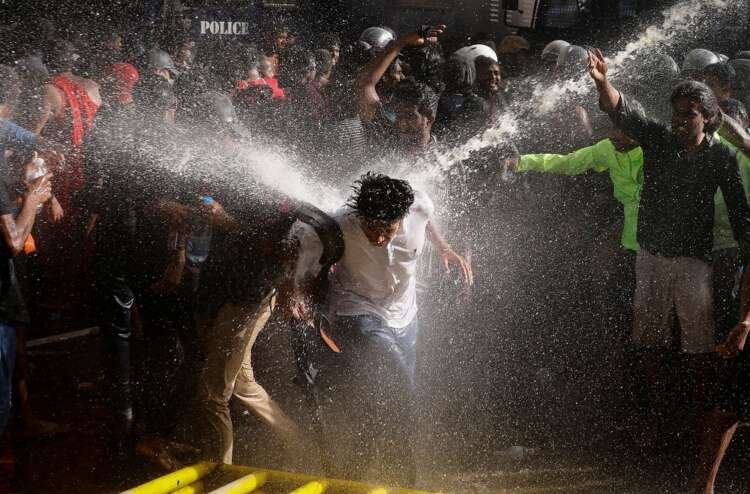Sri Lanka fuel shortage set to ease; police clash with protesters


By Uditha Jayasinghe and Devjyot Ghoshal
COLOMBO (Reuters) -Sri Lanka’s central bank has secured foreign exchange to pay for fuel and cooking gas shipments that will ease crippling shortages, its governor said on Thursday, but police fired tear gas and water canon to push back student protesters.
Most of Sri Lanka’s petrol stations have run dry as the island nation battles its most devastating economic crisis since independence in 1948. At some pumps in the commercial capital, Colombo, dozens of people stood in lines holding plastic jerry cans, as troops in combat gear and armed with assault rifles patrolled the streets. Traffic was extremely light.
Residents said most people were staying at home because of the lack of transport.
Hundreds of students carrying black flags marched on Colombo’s central Fort area, chanting slogans against the government. Police fired repeated rounds of tear gas and water canon to push them back, according to a Reuters witness.
Central bank Governor P. Nandalal Weerasinghe told a news conference adequate dollars had been released to pay for fuel and cooking gas shipments, utilising in part $130 million received from the World Bank and remittances from Sri Lankans working overseas.
He was speaking after the central bank held interest rates steady at a policy meeting, citing a massive 7 percentage point increase in April that it said was working its way through the system.
The country was more politically and economically stable, Weerasinghe said, adding that he would stay on in his post. He told reporters on May 11 he would resign in two weeks in the absence of political stability as any steps the bank took to address the economic crisis would not be successful amid turmoil.
Opposition parliamentarian Ranil Wickremesinghe was named prime minister last week and he has made four cabinet appointments. However, he has yet to name a finance minister.
Inflation could rise further to a staggering 40% in the next couple of months but it was being driven largely by supply-side pressures and measures by the bank and government were already reining in demand-side inflation, the central bank governor added.
Inflation hit 29.8% in April with food prices up 46.6% year-on-year.
Sri Lanka’s economic crisis has come from the confluence of the COVID-19 pandemic battering the tourism-reliant economy, rising oil prices and populist tax cuts by the government of President Gotabaya Rajapaksa and his brother, Mahinda, who resigned as prime minister last week.
Other factors have included heavily subsidised domestic prices of fuel and a decision to ban the import of chemical fertilisers, which devastated the agriculture sector.
“This is an economy that hasn’t actually fully recovered from the pandemic yet,” said Christian De Guzman, senior vice president sovereign risk at Moody’s. “Tourism, which is one of their engines of growth, hasn’t come back.”
TEST SUPPORT
Sri Lanka is also officially now in default on its sovereign debt as a so-called grace period to make some already-overdue bond interest payments expired on Wednesday.
Weerasinghe said plans for a debt restructuring were almost finalised and he would be submitting a proposal to the cabinet soon.
“We are in pre-emptive default,” he said. “Our position is very clear, until there is a debt restructure, we cannot repay.”
The central bank said energy and utility prices needed to be urgently revised, and analysts said the prime minister’s ability to push reforms through parliament and overcome public anger would be crucial.
“They need to bring in critical reforms and other measures to parliament to test their support and see if they really have consensus and stability,” said Shehan Cooray, head of research at Acuity Stockbrokers in Colombo.
He added, however, that the situation had taken a turn for the better. “Given that there was a point where it was even difficult to find a governor, the fact that he has decided to remain is a good thing,” Cooray said.
A spokesperson for the International Monetary Fund said on Thursday the fund was monitoring developments very closely and that a virtual mission to Sri Lanka was expected to conclude technical talks on a potential loan program to country on May 24.
Wickremesinghe, speaking in parliament, said the government was working to release six fuel shipments that had arrived at Colombo’s port.
“There are two petrol shipments among them but this will not end the shortages,” he said, adding that supplies had been locked in only until mid-June.
“Our aim now is to reduce the lines and find a way to start a fuel reserve so even if a couple of shipments are missed there is fuel available.”
However, there is considerable opposition to him. Protesters agitating for the removal of the Rajapaksa brothers say he is their stooge.
(Additional reporting by Swati Bhat, David Lawder and Jorgelina do Rosario; Writing by Raju Gopalakrishnan; Editing by Robert Birsel and Chizu Nomiyama)
Inflation is the rate at which the general level of prices for goods and services rises, eroding purchasing power. It is often measured by the Consumer Price Index (CPI) or Producer Price Index (PPI).
Debt restructuring involves reorganizing the terms of an existing debt agreement to reduce the burden on the borrower, often through extending the payment period or reducing the interest rate.
Foreign exchange refers to the global marketplace for trading national currencies against one another. It is essential for international trade and investment.
Economic growth is the increase in the production of goods and services in an economy over a period of time, typically measured by the rise in Gross Domestic Product (GDP).
Explore more articles in the Top Stories category











